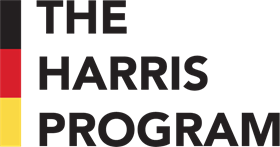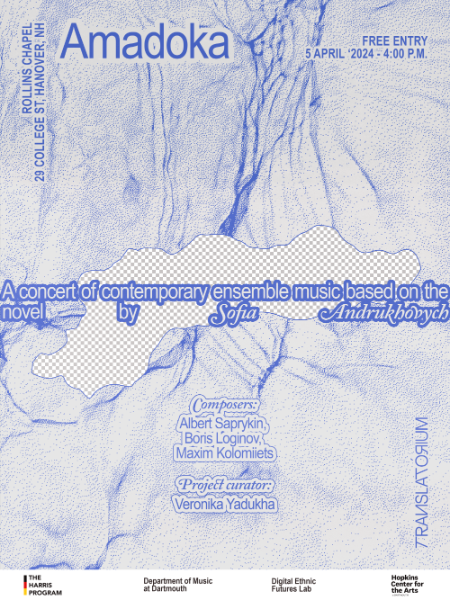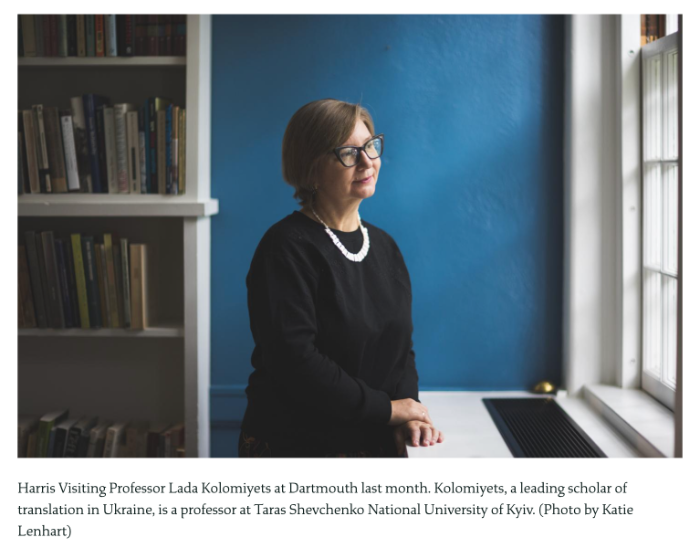News & Events
The Harris German Program's 2025 Walter Picard Lecturers
Till Fellrath and Sam Bardaouil
PUBLIC LECTURE – THURSDAY, JANUARY 30, 2025, 5:00 P.M., GILMAN AUDITORIUM (Hood Museum)
"Rewind. Rewrite. Re-Orient. Can Curation Change Perspectives?"

Sam Bardaouil and Till Fellrath are the co-directors of the Hamburger Bahnhof in Berlin. The Hamburger Bahnhof is one of the largest and most significant public collections of contemporary art in the world.
Prior to their arrival there, they were associate curators at the Gropius Bau, Berlin, from 2017 to 2021. The pair are known for centering inclusion in artistic and institutional practices, and for their revisionist approach to art history.
Some of their museum exhibitions include ‘Mona Hatoum: Turbulence at Mathaf’, Arab Museum of Modern Art in Doha (2014), and ‘Songs of Loss and Songs of Love: Oum Kulthoum and Lee Nan-Young’ at the Gwangju Museum of Art in South Korea (2014). In 2013, Bardaouil and Fellrath were the curators of the Lebanese Pavilion at the 55th Venice Biennale and of the French Pavillion at the 59th Venice Biennale in 2022. Under their curatorial platform Art Reoriented, which they launched in 2009, they have collaborated with more than seventy museums worldwide.
Bardaouil and Fellrath have held teaching positions at the Tisch School of the Arts at New York University, the London School of Economics, the Singapore Institute of Management, and the American University of Beirut among other institutions. Their academic research projects include collaborations with numerous institutions such as the Institut National d’Histoire de l’Art (INHA) in Paris, the Haus der Kunst in Munich, and the Museum of Modern Art (MoMA) in New York. They have authored and contributed to numerous publications such as ‘Overcoming the Modern: Dansaekhwa-The Korean Monochrome Movement’, ‘Iran Inside Out’, ‘ItaliaArabia’, and their recent book ‘Summer, Autumn, Winter… and Spring: Conversations with Artists from the Arab World’.
Film Director Henk Handloegten Visits Dartmouth with The Harris German Program

Henk Handloegten is best known as the co-director of the internationally successful TV series Babylon Berlin. This series is deeply researched, and artistically innovative exploration of the visual culture and politics of the Weimar Republic and the Third Reich. It is based on a series of historical detective novels by the author Volker Kutscher, who has also been a guest at Dartmouth in the past.
The German Studies department worked closely with Bowdoin College and Middlebury College to bring Handloegten to the U.S. At Dartmouth, Handloegten visited the large lecture class German 13 (Beyond Good and Evil). There he presented two- episodes of his multi-season TV series to the broader public in the afternoon/early evening event. He also interacted with the twenty students who were enrolled in the Jewish Studies/German Studies FSP program Migration and Memory. This was an excellent opportunity for students and faculty to interact with an internationally recognized director from Germany and to delve deeper into a crucial and now relevant period of German history.
Book Talk
with Harris German Visiting Professor Lada Kolomiyets
November 18, 2024 at The Max Kade German Center, 4:30 p.m.
Contributing Editor Dr. Prof. Lada Kolomiyets presents "Living the Independence Dream" with special guest speakers:
- Dr. Yuri Shapobal - Researcher, the Gerda Henkel Foundation
- Dr. Antonina Berezovenko - Associate Professor at the National Technical University of Ukraine
- Judge Bohdan Futey - Senior Judge of the United States Court of Federal Claims
- Stuart Finkel - Moderator - Dartmouth College Professor
(left to right, Stuart Finkel, Dr. Antonina Berezovenko, Dr. Prof. Lada Kolomiyets)
AMADOKA: A concert of contemporary ensemble music based on the novel by Sofia Andrukhovych
In just four weeks, on April 5, 2024, AMADOKA, a concert of contemporary ensemble music based on the novel by Sofia Andrukhovych, will take place at 4 PM in Rollins Chapel. Entrance is free.
AMADOKA sprung from Veronika Yadukha’s (COLT MA ’23) translation between different forms of art, which is also the subject of my academic work at Dartmouth. Ukrainian composers Albert Saprykin, Boris Loginov, and Maxim Kolomiiets each translated one volume of the novel into music, creating distinct pieces that come together in a singular listening experience. The ensemble performing AMADOKA will include musicians both from Ukraine and local to the Upper Valley, and the concert will be followed by an informal discussion in Batchelder Lounge with the curator and composers, offering the audience further insight into both the novels and the composition’s context.
AMADOKA: a concert of contemporary ensemble music based on the novel by Sophia Andrukhovych is a collaboration between TRANSLATORIUM NGO, artists and composers from Ukraine and musicians and scholars from Dartmouth and the Upper Valley. It is sponsored by the Harris German Program at Dartmouth College and supported by Dartmouth’s Department of Music, Digital Ethnic Futures Lab, Comparative Literature Program, and Hopkins Center for the Arts.
Reception to follow.
Sponsored by the Harris German Program
Please join us for this free concert event on:
Date: Friday, April 5, 2024
Time 4:00 p.m.
Place: The Rollins Chapel at Dartmouth
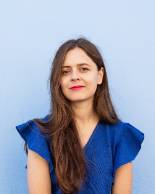
Project Curator - Veronika Yadukha
Albert Saprykin - Composer, pianist
Boris Loginov - Composer, pianist
Maxim Kolomiiets - Composer, oboist
Orest Smovzh - Violinist
A Round Table Discussion: Filming the Lebanese War
with:
Academy Award Winning Film Director: Volker Schlöndorff
Montgomery Fellow: Hoda Barakat
Harris Visiting Professor: Rabih Mroue'
Professor of Middle Eastern Studies: Tarek El-Ariss
This round table discussion took place on April 20, 2023. To watch and listen to this discussion, please use the link below.
Vox Populi: Ukrainian Character, Russian Folly
An Article by Professor Lada Kolomiyets
Determination, and good humor, are embedded in everyday Ukrainians.
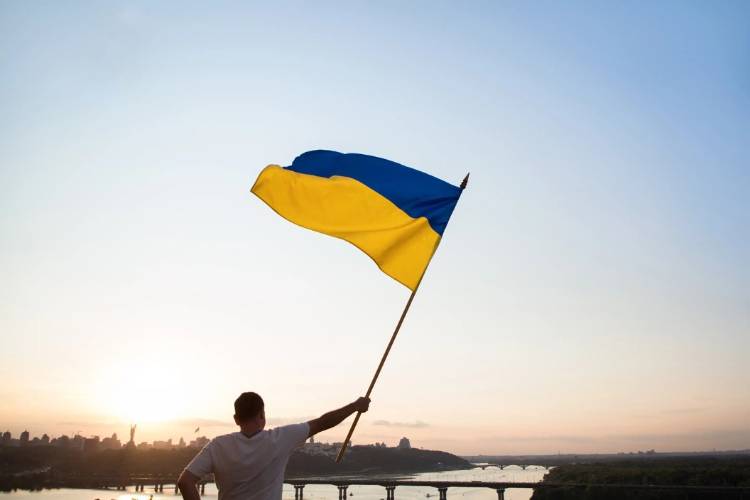
A supporter of Ukraine signals his sentiments as he stands on the roof of a house overlooking the Dnipro River in Kyiv.
(Photo by Anna Pasichnyk/Shutterstock) 6/29/2023
With the expansion of Russia’s war on Ukraine in February 2022, ordinary people in Ukraine and those who became refugees abroad not only volunteered and sacrificed to defend their country, but also opened new virtual fronts as chroniclers of their war experiences by reaching out to broader audiences on social platforms.
Almost immediately, the Ukrainian civilians’ optimism and determination to win, their sharp and full-of-positive-energy humor were recognized by the world press as a powerful weapon. Fighting by means of verbal and visual art, everyday Ukrainians are creating new narratives about themselves and forming their decolonized national identity as a renewed, cohesive, democratic society.
A good sense of humor even in the worst of circumstances is a traditional feature of Ukrainian character. Internet textual representations of this phenomenon as part of Ukrainian moral resistance are numerous. Public networks help create a sense of community, support, and moral strength, articulate attitudes, and formulate new narratives.
The most well-pronounced samples of the wartime Ukrainian folklore are massively shared and reposted on individual, commercial, and institutional webpages. They quickly spread through social platforms, lose their authorship, if any, and enrich the treasury of Ukrainian digital folklore.
"A good sense of humor even in the worst of circumstances is a traditional feature of Ukrainian character".
LADA KOLOMIYETS, VISITING PROFESSOR FROM UKRAINE
Among the most vivid examples is the following updated traditional proverb: “Ukrainians are invincible. When it’s bad, they cry, when it’s very bad, they sing, and when it’s very, very bad, they laugh. But they never give up.”
In the global arena, the Ukrainian language has become a trendsetter in the field of neologisms. For instance, the popular online Urban Dictionary records new words and phrases of the Russo-Ukrainian war, such as “to be Ukrained,” defined as “when you are Russia and you invade a country and the response is humiliation on a global forum.”
Existing words have taken on new meanings, as well, with “Russophobia” now meaning “the dislike of getting your country invaded by Russia.”
I had the opportunity to talk about Ukraine’s popular mobilization in cyberspace as a tool of social cohesion at a working summit in Washington, D.C., earlier this month, which included a second annual report card on Ukraine amidst the war.
The June 14 forum brought together government and key nongovernment representatives from Ukraine, Canada, the European Union, and the United States to take measure of Ukraine’s 2022-2023 progress and regress in six traditional categories associated with advanced polities: democratic governance, mature market economics, energy security, general security, social cohesion and an established yet forbearing national identity. In total, more than two dozen featured speakers addressed the conference proceedings.
Out of the six categories by which Ukraine’s achievements over the past year were assessed, the highest grade “A” was given to Ukrainian society—due to its high mobilization potential, social cohesion, and resilience as well as changes in national self-identification. In particular, as evidenced by the results of a survey conducted in Ukraine earlier this year, the absolute majority of respondents identify themselves as citizens of Ukraine (compared to 2021, the indicator increased from 76% to 94%). As for the evaluations of the actions of the Ukrainian government in such categories as democratic governance, mature market economics, energy security, and general security, the grades ranged between “B” and “C” (including pluses and minuses).
And on June 14 and 15, a “Ukrainian Days” advocacy event was held on Capitol Hill, sponsored by the Ukrainian National Information Service, the Washington-based public affairs bureau of the Ukrainian Congress Committee of America, an umbrella organization representing the interests of nearly 2 million Ukrainian Americans.
It was an important endeavor for the Ukrainian American community as they advocate for increased support for Ukraine to defend its territory against invading Russian forces.
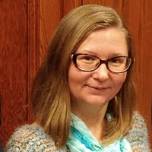
Lada Kolomiyets, a professor at Taras Shevchenko National University in Kyiv, is the Harris Visiting Professor at Dartmouth. (Photo by Katie Lenhart)
The goal was to promote Ukrainian Americans’ immediate concerns for increased security assistance for Ukraine; investigating and prosecuting Russian war criminals; imposing more sanctions against Russia; designating the Wagner Group as a foreign terrorist organization and Russia as a state sponsor of terrorism; freezing and seizing the assets of Russian oligarchs; recognition of the war in Ukraine and the Holodomor as genocide; and, condemning the illegal deportation and kidnapping of Ukrainian children to Russia.
The packed two-day schedule included meetings with members of Congress to address the need for urgent passage of specific resolutions related to, but not limited to, Russia’s war against Ukraine. The topics raised during the meetings revolved around the idea that it is in America’s national security interest to have Ukraine emerge from this war as a resilient sovereign and democratic state, in charge of its own foreign policy, militarily strong, with secured borders, and economically viable.
As part of a group, I personally met with Reps. Glenn Ivey and Jamie Raskin, who both appeared to be very supportive of the Ukrainian cause. Moreover, I was pleased to learn that Raskin, a Maryland Democrat, is a good acquaintance and admirer of a Yale historian of Ukraine, Timothy Snyder, as I am.
Then, this past weekend, back in Hanover, I watched as the military uprising of the Wagner private military company, owned and headed by oligarch Yevgeny Prigozhin, took place in Russia. On their march toward Moscow, the Wagner Group captured Rostov-on-Don, a city of more than 1 million people in southern Russia, before Prigozhin abruptly turned back.
How did everyday Ukrainians react to these events in the Russian Federation? Ukrainians immediately characterized Prigozhin’s military mutiny as a fight between a viper and a toad and proclaimed that they “cheered for both parties.” Ukrainian social networks exploded with memes about this blitz uprising, which was called a boomerang that returned to Russia. Captured without a fight, Rostov-on-Don was ironically renamed the “Rostov People’s Republic” (by analogy with Putin’s proxies in Ukraine, self-proclaimed Donetsk and Luhansk “republics”), and Ukrainians joked that Prigozhin would take Moscow “in three days,” alluding to Putin’s declaration at the start of last year’s invasion that Russian troops would take Kyiv “in three days.”
Comparisons with the August coup in the Soviet Union in 1991, after which the USSR quickly disintegrated into independent republics, were also actively played on. The confrontation between Minister of Defense of Russia Sergei Shoigu and mercenary chief Prigozhin has been interpreted as a déjà vu of dancing ballerinas from the classical Russian ballet Swan Lake, which was broadcast on all TV channels during the Kremlin coup in 1991.
So, when the apparent Prigozhin coup started, Ukrainians quickly settled into the front rows of YouTube streams to closely follow the “civil war in Russia,” exchanging a stream of new jokes and memes on social networks. When the march to Moscow ended as abruptly as it had begun, a comforting joke instantly spread in Ukrainian social networks: “You have listened to the trial version of the civil war in Russia. To get access to the full version, donate to the Armed Forces of Ukraine.”
Although the vast majority of Ukrainian political observers and experts today point to the staged nature of the Prigozhin coup, none of them deny that this event dealt a heavy, perhaps irreparable, blow to Putin’s power over his compatriots. With applause and enthusiastic, encouraging shouts, residents of Rostov-on-Don, mainly young people, saw off Prigozhin’s mercenaries, many of whom had been earlier convicted of murder and other serious crimes in Russia.
The scene testified both to the “thirst for blood” of Putin’s generals and to the indifference to Putin’s personal fate among the population in southern Russia. What keeps reverberating in my mind is a famous quote from Alexander Pushkin, one of the giants of Russian literature.
“Russian rebellion,” Pushkin wrote in a novel published in 1836, “is senseless and merciless.”
Lada Kolomiyets, a professor at Taras Shevchenko National University in Kyiv, is the Harris Visiting Professor at Dartmouth in the Department of Russian and the Comparative Literature Program.
***
Vox Populi is the Dartmouth News opinion page for commentary written by members of the Dartmouth community that is intended to inform and enrich public conversation.
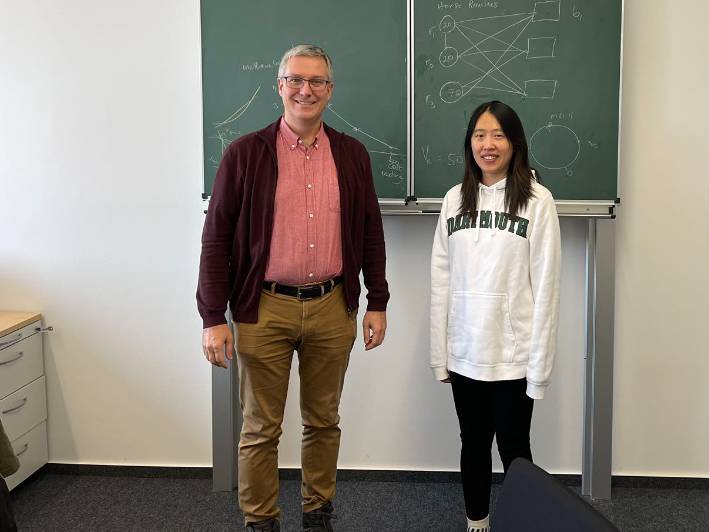 congratulations to yineng sun, the first student ambassador of the harris graduate student fellowship program (shown here with professor armin fügenschuh at Brandenberg university of technology, (btu) Cottbus-senftenberg germany)
congratulations to yineng sun, the first student ambassador of the harris graduate student fellowship program (shown here with professor armin fügenschuh at Brandenberg university of technology, (btu) Cottbus-senftenberg germany)
Yineng Sun (Phoebe) is a PhD student at Thayer School of Engineering at Dartmouth majoring in Operations Research. During her exchange study in Germany, she conducted research under Prof. Armin Fügenschuh at Brandenburgische Technische Universität Cottbus-Senftenberg. Her work focused on truck and drone collaborative delivery in e-commerce settings. Given a truck and drone delivery operation, she designed mathematical formulation and implemented experiments for detailed drone trajectory calculation with flexible take-off and land-back locations. She has presented her work in the international conference SIGOPT 2023."
a lecture by Academy Award Winning Director Volker Schlöndorff, followed by a screening of his film "The Voyager"
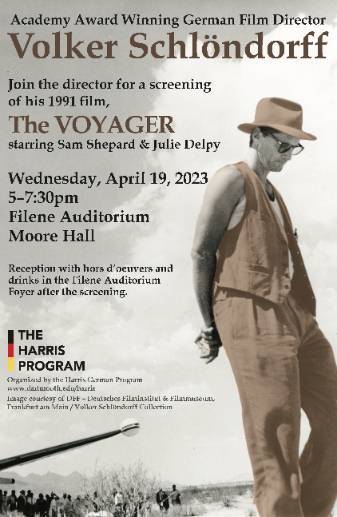
To watch and listen to Volker Schlöndorff's opening remarks to "The Voyager" click this link.
To see the movie "The Voyager", click this link
https://www.youtube.com/watch?v=O2mJEQWtF68
Walter Picard Lecture Series
Find information about past lectures and topics.
 Lecture by Professor Lada Kolomiyets, "How Ukrainian Folklore Is Dismantling Russia's Newspeak" January 25, 2023 To watch, please click the link below:
Lecture by Professor Lada Kolomiyets, "How Ukrainian Folklore Is Dismantling Russia's Newspeak" January 25, 2023 To watch, please click the link below:
Scholars From Ukraine Find Refuge at Dartmouth
News subtitle Despite the war, ‘the Ukrainian muses are not silent.’
Often, Ukraine is seen solely through the lens of various conflicts, says Komska, who is also chair of the Comparative Literature Program. One way to shift that is to bring in people who “can speak to Ukraine as a country and culture that’s vital and vibrant.”
Last week, Kolomiyets spoke as part of Voices of Ukraine, an eight-part virtual series showcasing Ukrainian writers and scholars. The events, which continue through February, were organized by staff and faculty in the Department of Russian, the Comparative Literature Program, and the Leslie Center for the Humanities, which is also sponsoring the series. The research fellows for the series are Daryna Gladun and Karina Madzari, both Guarini ’27. The upcoming speakers include Leslie Center Fellow Hanna Leliv.
Komska says several professors and administrators have asked her to connect them with Ukrainian scholars to speak in their classes, and she hopes more requests will follow.
And, as the students and faculty settle in, “random offers of help and home-cooked meals” would be greatly appreciated, she says. “I think the bigger the support network, the merrier.”
Ukrainian Muses
This fall, Kolomiyets is teaching “Topics in the History of Translation and Censorship: Ukraine in Western European National Contexts” in the Department of Russian and the Comparative Literature Program. The course focuses on the country “not only in war, but beyond the war,” and explores the “bright and dark” aspects of translation, she says.
Translation can serve nation-building efforts, strengthening a country’s language and culture, and many writers and translators dedicate their lives to that purpose, says Kolomiyets, who is also a literary scholar. On the other hand, she notes, translation also can be a vehicle for “vicious censorship.”
During her time in Sweden, friends and colleagues sent Kolomiyets announcements about a variety of grants, scholarships, and teaching opportunities.
She applied to three institutions and was accepted at each, leaving her with a difficult decision, Kolomiyets says. Coming to Dartmouth “was a very good choice, because I like teaching, and I found here motivated, interested students.”
Dartmouth’s small community of Ukrainian students and their supporters have been active on campus since the invasion, organizing a rally to protest the invasion, public talks, and fundraisers to aid Ukrainian refugees and provide first aid kits and other medical supplies to the front lines. In May, the newly formed Ukrainian Student Association created a heartbreaking installation on the Green, with toys memorializing the children killed in the Russian invasion.
This term, Kolomiyets plans to start a club that would translate contemporary Ukrainian literature into English, prioritizing work produced in the past six months.
“It is very important to show English speakers that the arts are not silent in Ukraine,” she says. In fact, since Feb. 24, the arts have been enriched “with very high-quality texts.”
The club’s motto? “The Ukrainian muses are not silent.”
Importantly, Kolomiyets says, women’s voices—including the poets Halyna Kruk, Natalka Marynchak, Inna Horbach, Svitlana Didukh-Romanenko, and many others—have been “particularly powerful in these months of existential warfare,” and she considers it significant to bring their messages to an English-speaking audience.
‘The Ability to Be Who We Are’
Yadukha is a member of VERBatsiya, a collaborative translation group that has a long history of translating Beat Generation poetry into Ukrainian. She specializes in intersemiotic translation, which involves transposing one type of artwork into another.
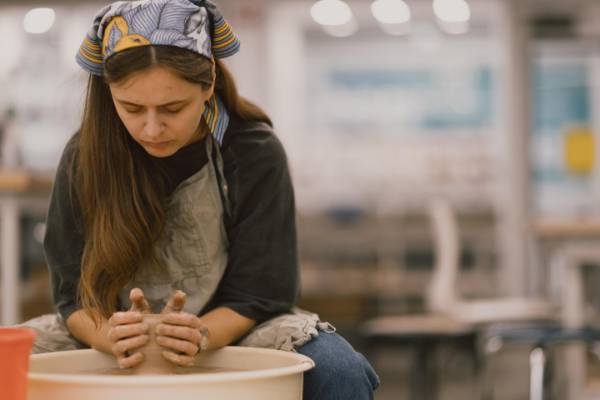
As part of her studies in comparative literature, she will translate poet Richard Brautigan’s book All Watched Over by Machines of Loving Grace into a series of ceramic tea bowls. The bowls—a nod to the influence of Zen Buddhism on the poet—will reflect the poetry’s meaning and emotional qualities. And she’s continuing to showcase Ukrainian culture on the international stage.
Yadukha is an art curator of Ukraine’s annual literary and translation festival TRANSLATORIUM. Last year, one of her projects—a musical composition based on a novel by Ukrainian writer Sophia Andrukhovych—played on opening night of the event.
The novel, Amadoka, takes its name from a lake believed to have been located in what is now central-western Ukraine, Yadukha says. It was thought to be the largest lake in Europe, yet during medieval times it disappeared suddenly from maps, and now, “nobody can say for sure whether it existed.”
Like the book, the musical production is a metaphor for lost memories, and explores several of the most traumatic periods in Ukrainian history—the Stalinist repression of the Ukrainian intelligentsia, World War II, and the Revolution of Dignity and subsequent Russian invasion in 2014, which had been ongoing until the recent escalation into a full-scale war, Yadukha says. And like the novel, it considers how each of the events continues “to influence all generations of Ukrainians.”
The 2022 festival was called off, due to the war. But Yadukha and her collaborators accepted an invitation to present the project, reworked for a German audience, at translationale berlin, a literary translation festival held last month in the capital city.
“Our culture was deliberately damaged several times. The people suffered a lot and are suffering now, and all the time it is about identity, the ability to be who we are,” Yadukha says.
“It’s very important to use all the opportunities we have to speak about Ukraine, Ukrainian culture, and the arts abroad.”
Professor Johannes Glückler delivers a lecture - "digitization and the new geography of stock photography"
Johannes Glückler discusses the effects of digitization on the industry of stock photography. The talk reveals new divisions of labor, new spatial relations among picture agencies and the formation of and regional upgrading within a highly dynamic global trade network. The lecture was invited by the Department of Geography & Harris German Distinguished Visiting Professorship Program at Dartmouth College, NH, USA on 23 February 2021.
NEW: Professor Hans-Theo Normann was a Harris German Visiting Professor during the 2018-2019 fiscal year with the Department of Economics. He recently published a paper in the Journal of Economic Theory, volume 195, July 2021 edition. Please click on the link below to download pdf or to link you to the journal article.
Games with Coupled Populations: An Experiment in Continuous Time
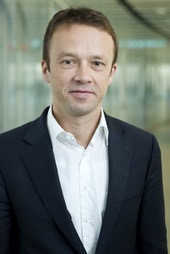
Professor Hans-Theo Normann
Heinrich Heine University
Duesseldorf Institute for Competitive Economics (DICE)
http://www.dice.hhu.de
Graduate Programs and Competitive Economics / Chair
email: normann@hhui.de

